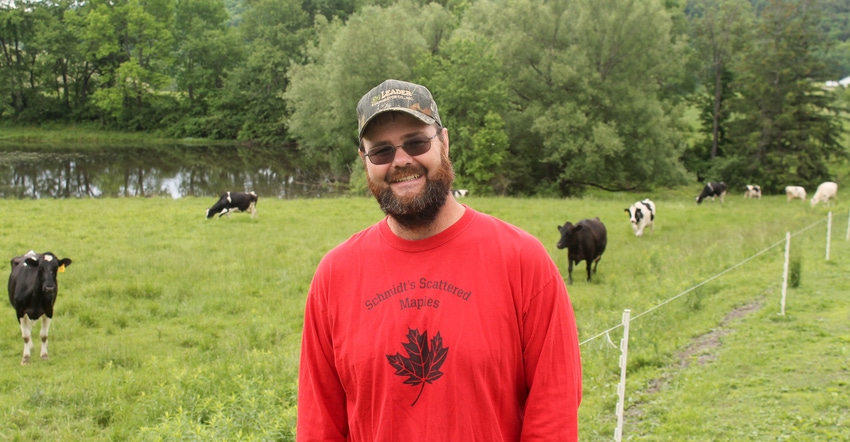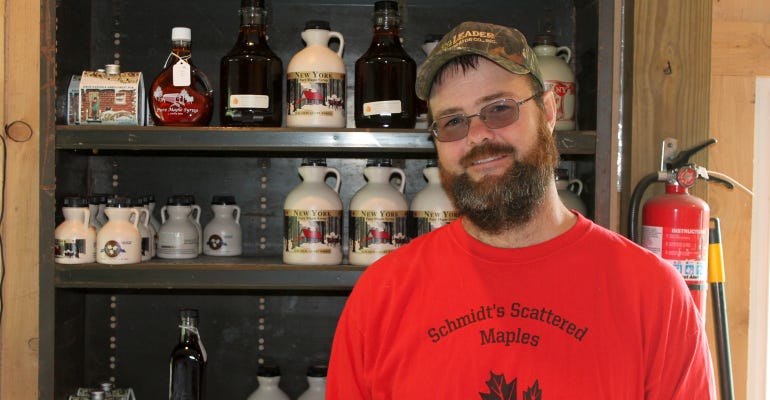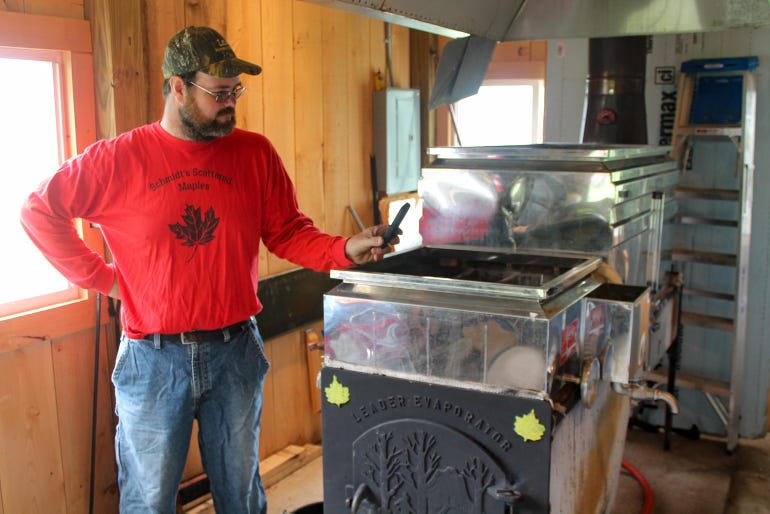December 13, 2018

By Kara Lynn Dunn
"Woodlots in New York state hold untapped potential for significant economic return through various enterprises," says Ken Smith, director of Cornell Extension Chenango County.
With a grant from the New York Farm Viability Institute, Smith has coordinated production of a "Profit From Your Forest" video series to spark landowners' interest in monetizing their woodlots.
"Of course, we highlight maple sugaring as a primary opportunity, but other options include such enterprises as firewood and timber harvesting, mushroom production, hunting lease, and rental cabins," he says.
Maple producer Mark Schmidt was featured in one of the videos at the request of his former high school agriculture teacher and FFA advisor, Rich Taber, now an Extension agricultural development specialist.
Schmidt revived his family's maple enterprise in 2016 and is now expanding production on his dairy farm in Sherburne. In the video, he is seen in the sugarhouse he built that overlooks a pasture and pond, and in the woods with tubing and a collection tank.
"In 2017, installing three-sixteenth tubing produced four times the sap yield on the same number of taps compared to buckets," Schmidt says in the video. "We have a significant fall in elevation, which gives us close to 28 inches of vacuum without a pump."
Schmidt says the operation largely produced syrup for family and friends until about three years ago. Today, visitors can buy direct from the sugarhouse, but most of Schmidt's Scattered Maples syrup products are retailed in specialty glasses, jugs and tins at local farmers markets by Mark Schmidt's wife, Andrea. Her colorful market display is seen in the video.
Schmidt cites Cornell maple specialist Stephen Childs as an "excellent resource." In two "Profit From Your Forest" videos, Childs talks about how to evaluate woods for maple taps per acre, access to trees on foot or by machine, and for power availability to run a vacuum pump. He also talks about the amount of slope needed for a natural vacuum system and how to evaluate tree species, tree health and soil health for maple production.

SWEET SALES: Visitors can buy direct from Schmidt's Scattered Maples, though most of the syrup and other products are sold at local farmers markets.

Schmidt creates his own videos for his business's Facebook page. He posts live updates throughout the maple season and during special events.
The Facebook page includes photos of Schmidt's dairy operation.
More stories from other producers
In the "Technology in the Maple Industry Equipment" and "Opportunities in the Maple Syrup Market" segments, Sandy Wilcox, a fourth-generation maple producer, talks about opportunities with reverse osmosis and other production practices, equipment retailing, sap and syrup sales, and leasing land.
"If you don't have the time for sugaring, leasing is a great way for an landowner to get income without cutting trees," says Wilcox, who sells maple equipment at her family's Countryside Hardware, established in 1920, in DeRuyter.
According to the videos, leasing land could generate 50 cents to $1.25 per tap, while selling sap could generate $2.75 per tap.
"Selling just sap is a great opportunity to can get into maple with much less cash flow than starting up a full-blown sugaring operation. You can sell sap a few years, recoup your money and then put up a sugarhouse. Figure yourself out a business plan," she says in the video.
Two additional maple operations and a custom sawmilling business are featured in videos.
Cook's Maple celebrated its 50th anniversary in Sherburne in 2018. The business, which started in 1968 with a 2-foot-by-2-foot pan in the driveway, offers syrup and value-added maple products. Chris Cook's advice is to "start small and keep it paid for."
While still dairy farming, Pete Walrod of Many Maples Farm and Sugar House in Georgetown tapped about 2,000 trees. After selling his cows, he expanded to 8,000 taps and now buys sap from other dairy farmers to produce syrup and a full array of value-added maple treats.
His motto is, "Never stop marketing. Maple is a sustainable agricultural enterprise."
The remodeling of Mike Davis' house at Marstan Farms drew people's attention. He began taking requests for custom woodcutting in 2004. With space to cut up to 35-foot-long timber, the sawmill added a secondary income — he also has a 95-cow dairy — driven solely by word-of-mouth advertising.
His advice to aspiring entrepreneurs: "Find something you enjoy and think you're good at."

ALWAYS CONNECTED: Schmidt creates his own videos for his Facebook page. He posts live updates throughout the maple season, and for special events and happenings all year using his cellphone.

Each video closes with encouragement to develop a business plan.
"Woodlots can produce a substantial economic return for New York landowners each year. Business planning helps determine the best option for your particular goals and forest resource," says David Grusenmeyer, executive director of the New York Farm Viability Institute.
The "Profit From Your Forest" series is online. Contact Smith at 607-334-5841, ext. 19.
Dunn writes from her farm in Mannsville. N.Y. NYFVI is a farmer-led nonprofit that invests in innovative projects to increase the success of ag production enterprises, protect farm-based natural resources and produce measurable farm-level results. Visit nyfvi.org for more information.
You May Also Like




